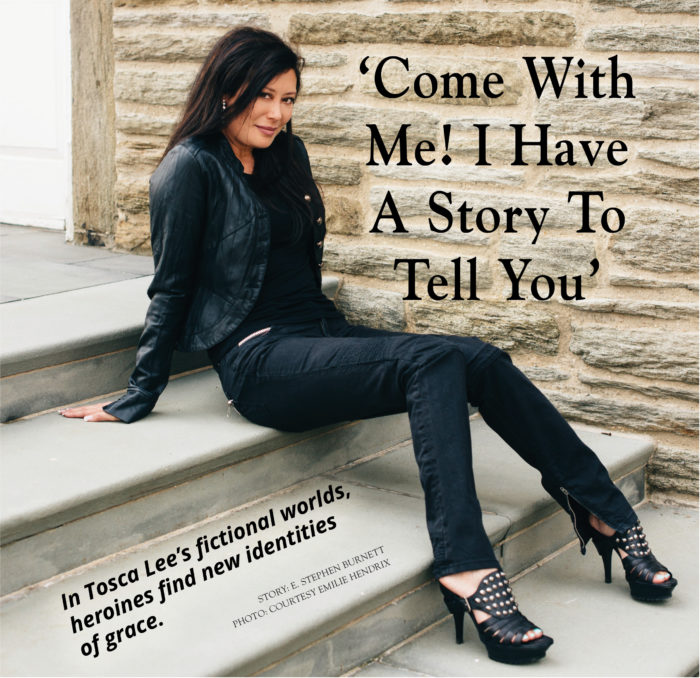‘Come With Me! I Have A Story To Tell You’
The kids used to call her “Weird Tosca.”
That’s because, from an early age, Tosca Lee found her greatest love for stories in the science fiction and fantasy genres. She lived Robert Silverberg’s Lord Valentine’s Castle, breathed Star Wars, and began writing her own short stories and poetry.
“I firmly believed Luke Skywalker was going to come for me in his land cruiser,” Lee recalled. “I had a very vivid imagination!”
Before she became a bestselling novelist, Lee considered two other career fields: first, ballet, and later, TV news anchoring. But while driving with her father one day, Lee began discussing her latest favorite fantasy novel, Marion Zimmer Bradley’s The Mists of Avalon, about the women behind King Arthur’s throne.
Lee suddenly said to her father, “I think I’d like to write a book.”
Her dad replied, “I will pay you what you would have made working as a bank teller this summer . . . if you will spend your summer full-time writing your first novel.”
Between her college freshman and sophomore years, Lee wrote that first novel.
“I love books where you shut the back cover and you feel this sense of longing and pain,” she said. “You got pushed out, at the end, against your will. . . . It’s almost painful, because with the really good books, you just want to be back in there. I wanted to see if maybe I could give someone else an experience like that.”
From a ‘Demon’ to biblical fiction
Like some first novels, that story never found a wider audience. But some years later, Lee felt drawn to another story. This one would follow a fallen angel who recounts his own memoirs of rebellion against God and corruption of humanity.
“I love books where you shut the back cover and you feel this sense of longing and pain.”
— Tosca Lee
Lee finished that story in six weeks and became sure God was helping her.
But Christian companies kept rejecting the book, until NavPress published it with the title Demon: A Memoir (2007). (It has since been reissued by other publishers.)
“To write a book about a fallen angel, it just made sense for me as a Christian to make it Scriptural as possible,” Lee said. “It’s actually the story of grace from an inverted point of view. . . . Demon is the story of the Bible. It’s the story of God’s love affair with humans, told from the viewpoint of an outsider who watched it play out.”
Lee later wrote several other biblical fiction titles, such as Havah: The Story of Eve (2008), Iscariot: A Novel of Judas (2013), and The Legend of Sheba: Rise of a Queen (2014). She also co-wrote novels with Ted Dekker from 2011–2013.
Yet Lee felt drawn to dive deeper into contemporary tales for more readers.
“I have a lot of different stories to write!” Lee said. “I also really like sci-fi. I like fantasy. I like a little romance every now and then. I have many interests as far as storytelling go. And I do enjoy the process of, on that first page, saying, ‘Come with me! I have a story to tell you. You’ll never believe what happened.’”
Many novelists tend to stick with one genre. But publishers can risk supporting authors whose readers are willing to follow them into different tales, Lee said.
“I call my readers ‘intrepid souls,’” she said. “Maybe I’m just not as weird as I thought I was.”
Finding The Line Between
Lee’s thriller duology The Progeny and Firstborn (2016–2017) follows a young woman, running from her own memories, who’s descended from a serial killer.
Next, Lee had two story ideas. First, an incurable virus escapes from melted Arctic permafrost and plagues the world. Second, a young woman escapes from a cult and must struggle to see the outside world and its graces through new eyes.
Her publisher suggested joining the two ideas. The result: Lee’s apocalyptic thriller The Line Between (January 2019) and its sequel, A Single Light (September 2019).
“We’re fascinated with how these [cult] leaders can have this kind of pull over people, and what it is that attracts people to organizations like this.”
— Tosca Lee
“I’ve been fascinated with the idea of cults for a long time,” Lee said. “You see it in a lot of TV drama. . . . We’re fascinated with how these leaders can have this kind of pull over people, and what it is that attracts people to organizations like this.”
Lee based The Line Between’s fictional cult on a variety of groups, blending a little health food obsession, some end-times fear, and a lot of spiritual manipulation.
No matter their religious origins, cults share several elements, Lee said. They’re run by charismatic leaders. Their members organize efforts to “love bomb” new cult members and make them feel accepted. Then, slowly, the group increases its strictness. They separate new members from their family members and the outside world. They often force members to surrender their property to the group.
“I really feel for the people who come out of these groups, especially because they come out of great spiritual abuse and sometimes sexual abuse,” Lee said.
Next: the stories jump to TV series
Just as The Line Between released, Deadline.com announced that Radar Pictures and Marlboro Road Gang Productions want to adapt these novels for a television series. Both firms had already locked in Lee’s The Progeny duology for a series at The CW.
Radar Pictures helped produced the Sony film Jumanji: Welcome to the Jungle (2017), and recently sold The Wheel of Time series to Amazon Studios.
Lee said filming or release schedules for either series have not yet been decided.
“Right now, The CW has the pilot script for The Progeny,” she said. “So much of this is waiting. This news came out in November, and it seemed like it was very sudden. But this has been in process for four years. . . . It is really exciting. I’m not gonna lie!”
Meanwhile, Lee said she has recently pitched another amazing story.
“If I told you, you would like it,” she said. “It’s cool. That’s all I’m going to say.”
Yet Lee said her stories will likely keep focusing on themes of core human identity.
“I really feel like that’s at the heart of every single story,” she said. “It’s a question of, ‘Who am I, who do I think I am, and who am I really? Who do I feel that I should be, and who am I supposed to be?’ . . . The tension between being stronger than you think you are. And also reaching the point where you know when to surrender. I think, as a person of faith, that’s a tension that we all have to hold.”




































[…] Read our interview with bestselling novelist Tosca Lee. […]